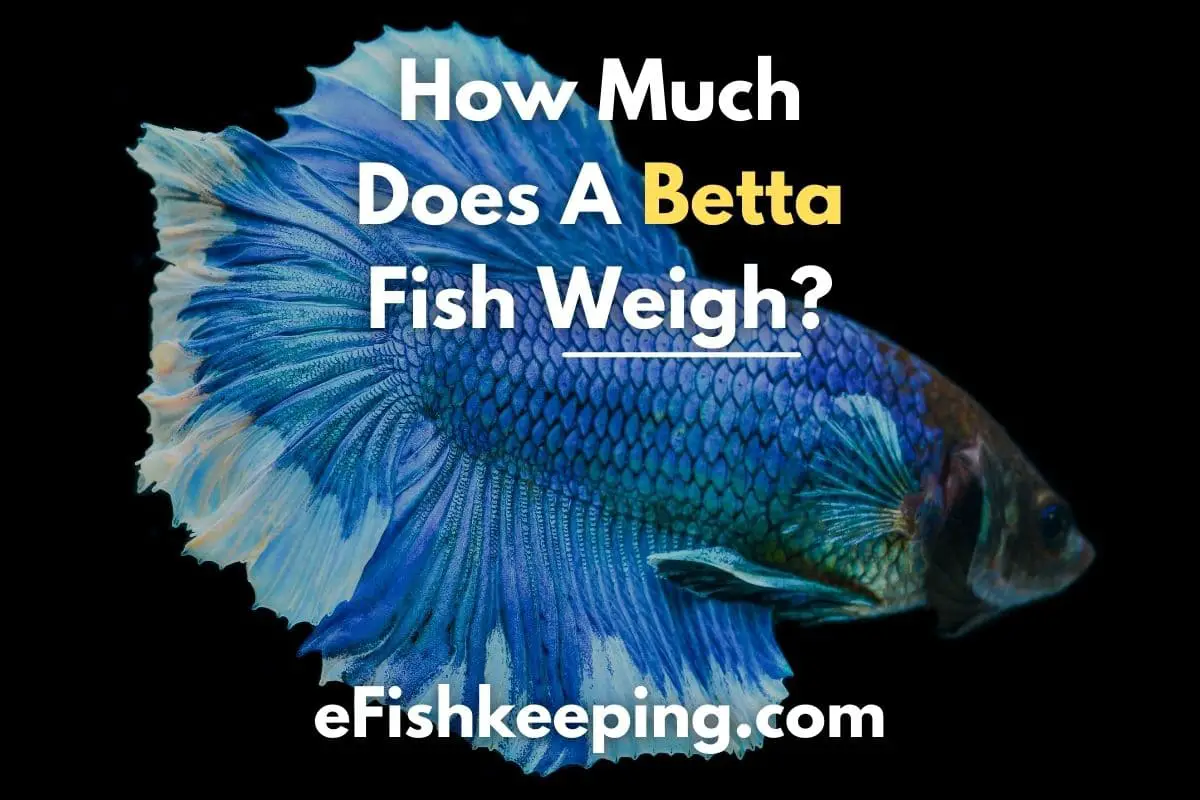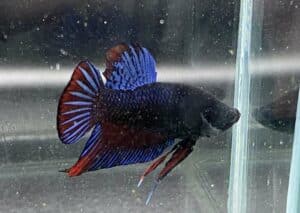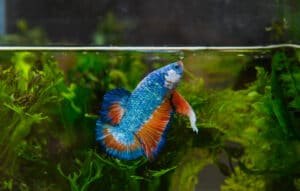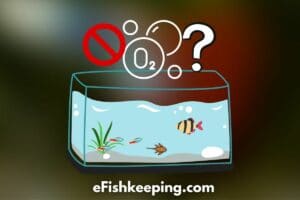Beginner betta fish keepers often wonder if their betta is healthy or not. But to know if your betta fish is healthy, it is essential to keep an eye on its weight. That is when you ask yourself how much does a betta fish weigh?
The average weight of a growing betta fish is around 2 to 3 grams. However, the weight can be more or less depending on the fish’s diet, environment, and health. Some grown or adult betta fish can weigh as much as 4 grams.
Now, looking at the ideal weight, does it seem your betta fish is overweight or underweight? I’m not surprised if you are concerned because either of them can affect your betta’s lifespan and well-being.
Let’s dive further into the article and see if there is a way to fix this betta weight problem.
How Much Do Betta Fish Weigh?
While a baby betta or betta fry weighs only about 0.02 to 0.05 grams, a growing betta fish can weigh at least 3 grams to 3.5 grams, especially if it is healthy. And as the fish grows older and larger, it can gain more weight and can end up weighing around 3-4 grams or more.
Bettas are carnivorous and live on insects and insect larvae. It is one of the main factors behind their incredible and healthy growth. However, tank bettas do not get to live on insects unless you provide them with such food.
But these fish have excellent skills in adapting to different environments. As a result, most pet bettas either grow as herbivores or omnivores. And their diet plays a significant role in their weight.
Bettas go through various growth stages, and their length and weight change with each stage. And, as I mentioned earlier, bettas weigh differently when they are newborn fry or adults.
But how much does a betta fish weigh? Here I have created a weight chart to make it clear how much a betta fish weigh on various age stages. I have shown the healthy weight in three different units so that it becomes easier for you to remember.
| Betta Age | Betta Weight(Grams) | Betta Weight(Pounds) | Betta Weight(Ounces) |
| 1 Day Old Fry | 0.01-0.02 | 0.0006 | 0.0105 |
| 1 Week | 0.03 | 0.0011 | 0.0176 |
| 1 Month | 0.05 | 0.0022 | 0.0352 |
| 3 Months | 2.5 | 0.0055 | 0.0881 |
| 4 Months | 3 | 0.0066 | 0.1058 |
| 5 Months | 3.5 | 0.0077 | 0.1234 |
| 6 Months | 4 | 0.0088 | 0.1410 |
Note: I have taken the average weight of betta fry from this research article [Evaluation of growth performance and breeding habits of fighting fish]. The average weight of an adult betta fish is taken from this source. “And then I have estimated the rest of the data to complete the table. Although I have tried my level best to present the most accurate estimations, please consider them only as a rough and general guideline.”
The weight between male and female betta fish varies too! If you look at this research by the Thai National ARGIS Center on betta anatomy and histology, you will see that the growth and weight of male and female betta change slightly.
So I would say it is better not to get too worried if your betta does not weigh exactly what the charts and researches show.
How Big Can A Betta Fish Get?
The average length of a betta fish is 1.9-2.25 inches, but some betta fish can grow as big as 3 to 4 inches if they live and grow in a healthy environment. The longest recorded betta fish is about 6 inches long, which is rare.
Betta fish is one of the fascinating fish you will come across. These tiny little fish can grow in containers, fish tanks, and even open water sources.
Since I am discussing betta fish’s weight, it is okay to be curious about its length. And just so you know, the places or environment they grow or the type of food they eat influences their health and growth.
Nevertheless, bettas grow to a certain length until they become fully grown adults. But how long do they grow?
- One Day Old: The betta fry came out of the egg only some hours ago. It will be only 0.01 to 0.02 inches in length. The tail will not show at this stage.
- One Week Old: On its second week, the betta fish will be around 0.03 inches long.
- Two Weeks Old: The betta will be around 0.25 inches long. You will see a slight growth in other parts, such as the dorsal fins, which will start to show.
- Three Weeks Old: The betta fish will be 0.35 inches long by the third week.
- Four Weeks Old: Once the betta gets close to being a month old, its average length will be 0.45 to 0.5 inches long.
- Five Weeks Old: The average length of a betta fish at this stage is usually about 0.6 inches. However, some of them can turn 0.7-0.75 inches long.
- Six Weeks Old: A six-week-old betta fish will measure 0.85-1 inch long. Only the longest bettas grow to be 1 inch at this point.
- Seven To Ten Weeks Old: You will notice that the betta fish is looking good and more in its full form between six to ten weeks. The length will go from 1.1 inches to 1.8 inches between this time.
- Eleven Weeks Old: A betta fish reaches its average length by this point. It will be 1.9 inches to 2 inches big.
(Betta fish length: Source)
After this stage, the betta will grow some more until it reaches adulthood. And a betta becomes an adult stage between six months to one year old.
The exact age can’t be said because it varies from betta to betta. But once the betta is fully grown, it will measure at least 2.25 inches or as much as 4 inches.
Related Guide: How Old Are Bettas You Get From Pet Stores?
Can A Betta Fish Get Fat?
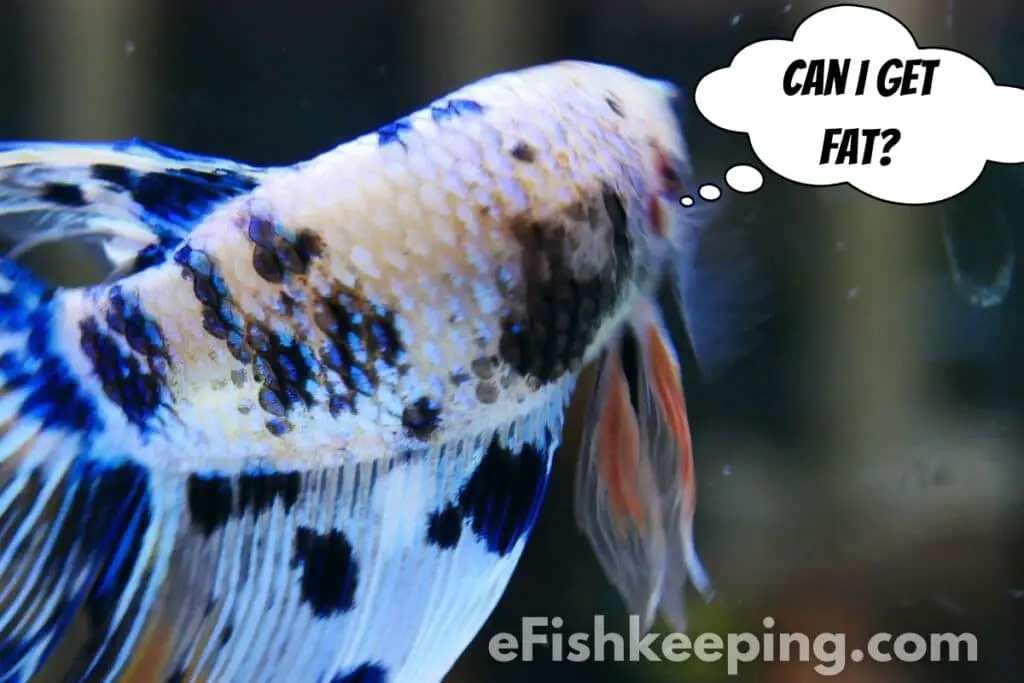
Even though it may sound surprising, betta fish can get fat for many reasons. Sometimes it can happen because the betta has a good appetite or what you are feeding it.
Being overweight is not as unusual among fish as you think. Betta fish can gain weight for more reasons, and let’s find out why.
Less Activity
Obesity is a common issue with bettas in captivity. While the ones in the wild remain more active and get to move around in a vast space, fish tanks, especially in small ones, bettas have limited space for moving. The lack of sufficient space often makes the betta less active, leading to obesity.
Food Habit
You do need to watch what you are feeding the betta fish. As much as you love spoiling your pet with more food and treats, overfeeding them can lead to excessive weight gain. It is best to maintain a routine on how many times you will feed the fish and how much food you will give during each meal.
Remember that the type of food the betta is eating plays a role in its weight gain. The best thing to do is give it food meant for betta fish. Leave enough food that the fish can eat in a minute. Sometimes a few small treats once or twice would not be bad either.
Water Temperature
Is the betta living at the right temperature? If not, you need to fix it because bettas do not do well in cold water temperatures.
The ideal temperature of tank water should be 25-28 degrees celsius. If the temperature is lower, the betta will have difficulty digesting its food and gaining weight.
How Can I Tell If My Betta Is Overweight?
The easiest way to tell if your betta is overweight is to look at the fish from the top or a dorsoventral view. If the betta’s head and shoulder appear of different shapes, or if the fish’s belly seems big and poking out in the middle, the betta is overweight.
Identifying a fat or overweight betta fish is pretty similar to identifying an overweight cat or dog. It all comes to their middle body part to tell the difference. The one feature of fish is that its head and shoulder have the same girth, and its internal body parts begin from its head and reach until the last third of its body.
If the betta has a regular healthy body, the head and shoulder will appear the same length.
On the other hand, if the betta is fat or overfed, you will notice how its head and shoulder appear different in length and shape. If its belly looks bigger and reaches beyond the girth, the betta is overweight.
What Happens When A Betta Fish Gets Fat?
If the betta fish becomes fat or overweight, it can lead to various diseases, including constipation and prolapse. Constipation leads to lethargy and can still be treatable, while a betta fish with prolapse has a lower chance of surviving.
One of the most common health issues that bettas show due to overfeeding or weight gain is constipation. And if you do not treat this issue, it can lead to other severe diseases. So if the betta appears to be suffering from constipation, you can keep it unfed for two-three days or give them frozen daphnia.
Prolapse is the most severe side effect of constipation in betta. When the betta begins to bloat, the organs fall out of their place.
And since the betta is a tiny fish, it is impossible to fix the issue through surgery. So the only and the kindest thing you can do to stop it from suffering is euthanize it.
How To Make My Betta Fish Lose Weight?
The best way to make betta fish lose weight is to change its food habit or decrease the amount of food you give it during each mealtime. The diet chart of the betta should have only sufficient protein and fat, and the food pellet you provide should be just enough.
Uncontrolled feeding or giving the betta food high in protein and fat makes it fat. And as you have already learned, it can become life-threatening for your precious fish. So the right thing to do as a concerned owner is to help it lose its weight.
It is okay to give the betta fish food containing fat and protein. But your job is to ensure the amount of food your fish is getting is not too much. If you think a certain type of food is causing the betta to gain weight, you can switch to a different food brand.
Next comes the food pellet you are giving it. Lower the number of meal pellets the betta is getting. Continue this for a few weeks, and it will help your betta lose weight. You can learn more about feeding betta fish from this YouTube video.
Also, try to spice up the diet once in a while. Don’t always go for pellets. Bettas love bloodworms, mealworms, freeze-dried shrimps, brine shrimp, etc. as occasional treats!
How To Fatten Up A Betta Fish?
If your betta fish is skinny, you need to help it grow healthy by feeding it nutritious food regularly. You can add high protein food to your betta’s daily diet and increase the number of pellets it gets during each meal, along with occasional treats.
Before you go ahead and feed the betta more, try to understand why it is skinny. If the betta refuses to eat the food you give it or does not eat much, you first need to switch to a different type of food.
You can give the betta multiple healthy food pellets during meals that contain frozen mysis or brine shrimp. The occasional treats should be rich in protein and fat to help your betta gain some weight.
Conclusion
Betta fish owners often ask, how much does a betta fish weigh? There is no precise answer for that, but all I can tell you is that the ideal weight for an adult betta should be 3 to 4 grams. But the weight does not matter as long as your betta fish appear healthy and active.
Just remember to check on it from time to time and ensure a healthy diet. And most importantly, make sure the betta fish tank has the proper water temperature and is friendly enough to allow the betta to grow well.
Read Next:
Hi! I’m Praveen Ghoshal, the founder of eFishkeeping.com. Inspired by my Dad, I got interested in fishkeeping when I was a kid. Since then, I have been involved with this hobby. Currently, I have 3 fish tanks at our home, and I enjoy this hobby with my full family. Read more about me here.

